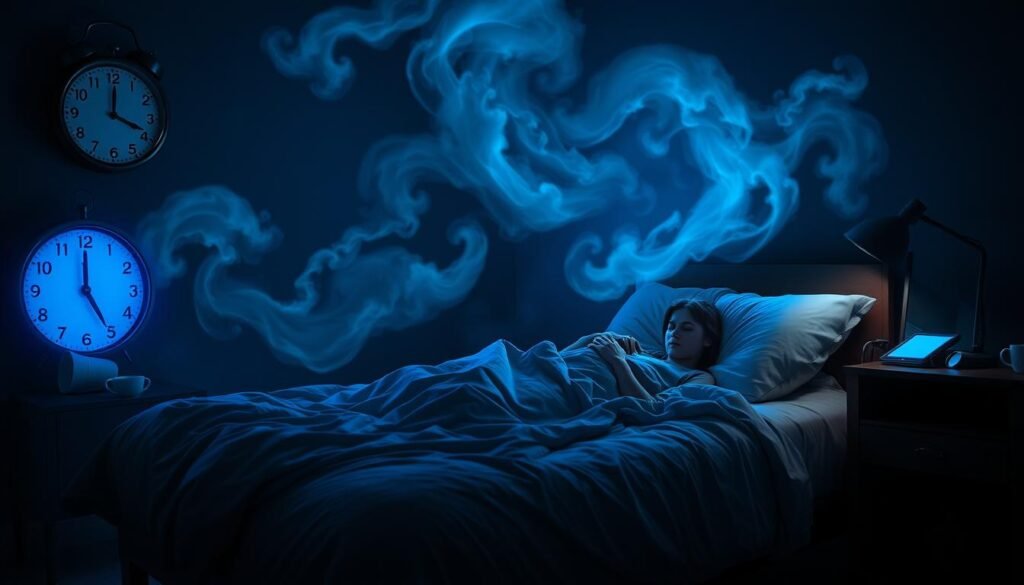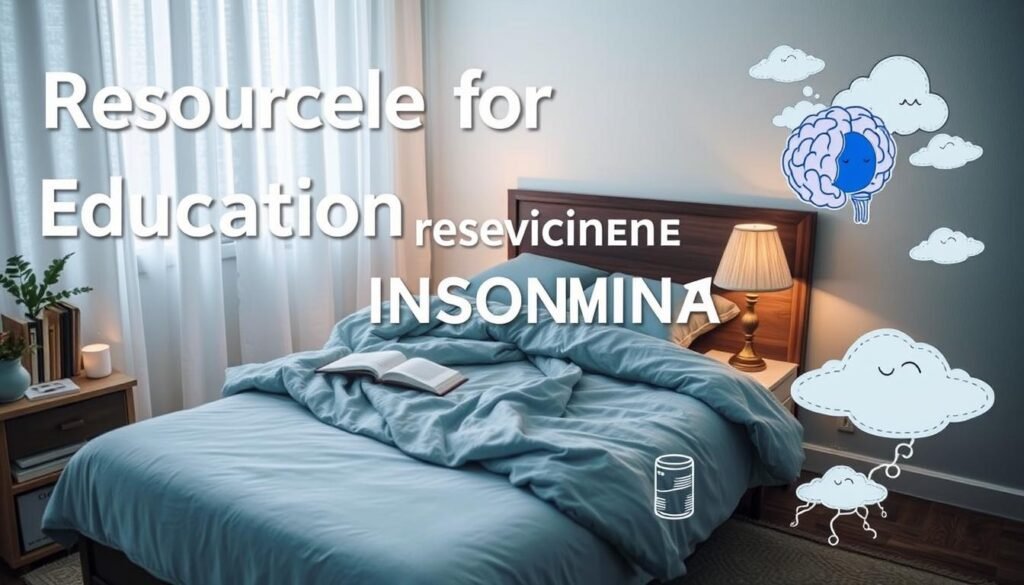About 30% of adults in the United States struggle with insomnia symptoms. It’s clear we desperately need better resources to understand and manage insomnia. It’s not just about learning; it’s essential for our sleep health and overall happiness. This article shines a light on insomnia. It talks about what it is, its symptoms, causes, how to treat it, and where to find help.
Using trusted tools from organizations like insomnia resources, you can learn how to handle sleep issues better.
Key Takeaways
- More than 30% of adults experience insomnia, highlighting its prevalence.
- Cognitive Behavioral Therapy for Insomnia (CBT-I) is often the first-line treatment.
- Various organizations provide essential resources, ranging from sleep education to treatment options.
- Establishing a regular sleep schedule and creating a conducive sleep environment are vital for improving sleep quality.
- Healthcare providers play a crucial role in guiding insomnia management tailored to individual needs.
Understanding Insomnia: The Basics
Insomnia is a sleep issue many people face. It includes trouble falling or staying asleep or waking up too early. It can greatly affect your daily life, causing fatigue, mood swings, and trouble focusing. Insomnia has various types and symptoms.
Definition and Symptoms of Insomnia
Insomnia symptoms vary by person and type. Common symptoms include:
- Difficulty falling asleep
- Frequent awakenings during the night
- Waking up too early
- Daytime fatigue and irritability
- Impaired memory and concentration
About 10 to 15 percent of adults struggle with chronic sleep issues. Insomnia is more common in older adults and women. It’s important to know how long you’ve had these symptoms and whether they’re occasional or constant.
Types of Insomnia
Insomnia is split into different types based on how long it lasts and other features:
| Type of Insomnia | Duration | Description |
|---|---|---|
| Short-term insomnia | Days to weeks | Usually caused by stress, events, or changes in your life. |
| Chronic insomnia | Three months or more | Happens at least three nights a week and may need more tests. |
| Delayed Sleep-Wake Phase Disorder (DSWPD) | Varies | This means having trouble going to sleep at a normal time. |
| Advanced Sleep-Wake Phase Disorder (ASWPD) | Varies | This leads to waking up early and not being able to sleep again. |
People of all ages can get insomnia, including children, teens, and adults. Treating the causes of this disorder is key to managing it.
Causes of Insomnia: What You Need to Know
Knowing why insomnia happens is key to managing it. Many things can start this problem. Medical conditions, mental health, and daily habits impact how well you sleep.
Medical Conditions
Insomnia can stem from health issues. Chronic pain and diabetes make sleeping hard. High heart rates and cortisol levels can mess up sleep too. So, people with certain health problems may struggle more with insomnia.
Mental Health Issues
Mental health and insomnia are closely linked. Anxiety and depression can make insomnia worse. About 35 percent of adults struggle with sleep, especially when stressed. Knowing this helps find the right treatment.
Lifestyle and Habitual Factors
Many lifestyle choices affect sleep. Odd sleep times, too much caffeine or alcohol, and noisy environments are bad for sleep. If you travel a lot or work odd hours, you might face insomnia. Good sleep habits can help lessen these risks.

| Factor | Impact on Insomnia |
|---|---|
| Medical Conditions | Chronic pain and diabetes can disrupt sleep. |
| Mental Health Issues | Anxiety and depression contribute to sleep difficulties. |
| Lifestyle Factors | Irregular schedules and substance use increase insomnia risks. |
| Age | Older individuals are more susceptible to sleep problems. |
| Gender | Women report higher insomnia rates than men. |
Resources for Insomnia Education
Various organizations offer invaluable resources for insomnia education. They help patients and healthcare providers. This knowledge allows individuals with insomnia to make informed choices and seek proper treatments.
American Academy of Sleep Medicine (AASM)
The American Academy of Sleep Medicine provides many educational materials. These are for the public and healthcare pros. The materials include guidelines, recent research, and training programs focusing on insomnia treatments. They educate people on sleep disorders and the need for treatment.
National Center on Sleep Disorders Research (NCSDR)
The National Center on Sleep Disorders Research works to advance sleep research and education. Their initiatives offer patient-friendly guides and videos on sleep disorders, including insomnia. This helps people understand sleep health better and manage their sleep issues.
National Sleep Foundation (NSF)
The National Sleep Foundation aims to better sleep health through education and outreach. They provide resources on treating and preventing insomnia. Tips and expert advice teach people to improve sleep habits and their well-being. They promote cognitive behavioral therapy as a top treatment for insomnia. For more on effective treatments, follow this link.

Sleep Hygiene: Essential Practices for Better Sleep
Creating a solid foundation for sleep hygiene can really boost how well you sleep. This can be done by making your sleeping area cozy and keeping a regular bedtime. These steps are key for anyone wanting to feel better and stay healthy.
Creating a Sleep-Friendly Environment
Making your bedroom perfect for sleeping is crucial. You should think about:
- Maintaining a cool room temperature, ideally between 60 and 67 degrees Fahrenheit.
- Utilize light-blocking curtains to keep the room dark.
- Invest in a high-quality mattress and comfortable bedding.
- Minimize noise levels and consider sound machines if necessary.
- Incorporate calming scents, such as lavender, to promote relaxation.
A cozy sleep setting can really help you sleep better. By being consistent with these changes, you’ll notice a big improvement in how well you sleep.
Establishing a Consistent Sleep Schedule
A regular sleep schedule is very important for good sleep hygiene. Some tips include:
- Set a fixed bedtime and wake-up time, even on weekends.
- Make gradual adjustments to your sleep schedule if necessary.
- Limit daytime naps to a maximum of one hour to avoid interference with nighttime sleep.
- Prioritize sleep as an integral aspect of daily routine.
Sticking to these tips can improve your sleep, making you feel more rested. For more help, check out this resource on bedtime routines.
Avoiding Stimulants and Distractions
To sleep better, it’s important to cut down on distractions. This means:
- Cutting out screens—television, smartphones, and computers—at least an hour before bed.
- Steering clear of stimulants, such as caffeine and nicotine, especially in the evening.
- Refraining from heavy meals and alcohol close to bedtime.
- Incorporating relaxation techniques, such as meditation or reading, to unwind before sleep.
By avoiding these distractions, you’ll have an easier time falling asleep. Paying attention to sleep hygiene can make your nights much more restful.

Effective Treatments for Insomnia
Finding the right approach to tackle insomnia matters a lot. There are several treatment options out there. These include Cognitive Behavioral Therapy for Insomnia (CBT-I), medication, and various alternative therapies. Each one has its own benefits, fitting different needs and situations.
Cognitive Behavioral Therapy for Insomnia (CBT-I)
CBT-I is a top recommendation for chronic insomnia sufferers. It helps change the negative thoughts and behaviors that disrupt sleep. Involving around six to eight sessions, it aims to build better sleeping patterns. Plus, CBT-I matches the effectiveness of sleep meds but without their side effects.
Medications: When and Why
Even though CBT-I is favored, pills can help in the short term when needed. For trouble falling asleep, some options are:
- Eszopiclone (Lunesta)
- Ramelteon (Rozerem)
- Zolpidem tartrate (Ambien, Ambien CR, Edluar)
If staying asleep is the issue, doctors might suggest:
- Doxepin hydrochloride (Silenor)
- Suvorexant (Belsomra)
- Temazepam (Restoril)
But, it’s important to use sleeping pills cautiously. They can lead to dependency and often make you feel groggy the next day. OTC sleep aids are not advised for long-term use, especially for older people.
Alternative Therapies
Other treatments include Melatonin, Valerian, and even activities like acupuncture, yoga, and tai chi. While good for relaxation, their direct impact on insomnia isn’t fully proven. Making lifestyle changes is key. A steady sleep schedule, daily exercise, and a cozy bedroom can make a huge difference in managing insomnia.
Educational Materials and Support Resources
Many groups offer helpful insomnia learning tools to better understand sleep problems. These include brochures, infographics, guides, and online stuff about sleep health. If you’re a teacher wanting to talk about the importance of sleep and good sleep habits, there are great materials for all ages. A great place to start is the educational resources from the American Academy of Sleep. They have lesson plans for different age groups.
Sleep Education Materials from Various Organizations
The National Sleep Foundation has a lot of resources to help people understand sleep health better. They have brochures and online articles about how our lifestyle affects our sleep and why a regular sleep schedule is important. This info is key because about a third of kids and most teenagers don’t get enough sleep.
Webinars and Workshops for Patients and Providers
Workshops and webinars on sleep health are getting more popular with patients and doctors. They share the newest research and ways to treat insomnia. People can learn how afternoon naps and drinking alcohol impact how well they sleep. Joining these sessions helps people know more about their treatment options and patient support tools.
The Role of Healthcare Providers in Insomnia Management
Healthcare providers are key in diagnosing and treating insomnia. They help patients manage insomnia management effectively. Knowing when to ask for help is important for better life quality. If improving sleep routines doesn’t work or insomnia affects daily life, it’s time to see a provider.
When to Seek Help
Patients should seek help if they:
- Struggle to fall or stay asleep more than three nights a week.
- Have sleep problems lasting over three months.
- Feel daytime tiredness or stress due to sleep issues.
Finding Specialists in Sleep Medicine
Finding sleep medicine specialists leads to better treatment success. They assess patients fully and plan personalized treatments. Providers guide towards non-drug treatments like Cognitive Behavioral Therapy for Insomnia (CBT-I), proven to work well.
There are resources to help practitioners understand effective treatments. A deep look into studies on insomnia stresses diverse treatment approaches. Providers should keep learning to offer top care. For more details, check out the role of healthcare providers and insomnia in forming a strong treatment strategy.
| Provider Type | Max Credit Hours |
|---|---|
| Case Managers | 1.0 clock hours |
| Certified Health Education Specialists | 1.0 entry-level contact hours |
| Nurse Practitioners | 1.0 contact hours |
| Registered Nurses | 1.0 contact hours |
| Pharmacists | 1.0 contact hours |
| Physicians | 1.0 AMA PRA Category 1 Credit(s)™ |
Understanding healthcare providers’ role is vital in managing insomnia. It helps people seek timely help and find treatments that meet their needs.
Additional Sleep Health Resources
Many groups offer insights on sleep health, key to better managing insomnia. These resources are vital for teaching the public about sleep importance. They also highlight risks of not getting enough sleep.
National Highway Traffic Safety Administration (NHTSA)
The NHTSA’s campaign against drowsy driving warns of the risks. It aims to cut down accidents by informing on better sleep. Tips include how to spot sleepiness and stressing rest before driving.
This work helps people see how crucial sleep is for safe driving.
Sleep Research Society (SRS)
The SRS works to deepen our understanding of sleep with research. They publish studies and info on sleep health. Their research often starts important conversations on sleep and daily life.
They stress engaging with the community to boost sleep health information in schools, hospitals, and policy.
Conclusion
Insomnia affects many people, but it can be treated. Helpful groups like the American Academy of Sleep Medicine (AASM), the National Center on Sleep Disorders Research (NCSDR), and the National Sleep Foundation (NSF) provide great information. They help people understand and manage insomnia. With their guidance, you can find ways to sleep better.
Adopting healthy sleep habits is key to fighting insomnia. This includes keeping a regular bedtime and reducing light before sleep. These habits improve your sleep health. It’s also crucial to realize how sleep affects school and social life. For teens, programs show how good sleep leads to better health, grades, and happiness.
Given the rise of insomnia, using all resources and getting expert advice when needed is recommended. Strategies focusing on behavior change and sleep hygiene can make a big difference. If you want to overcome insomnia, consider these effective steps. For more help on insomnia, check this useful article. It talks about important behaviors and treatments.